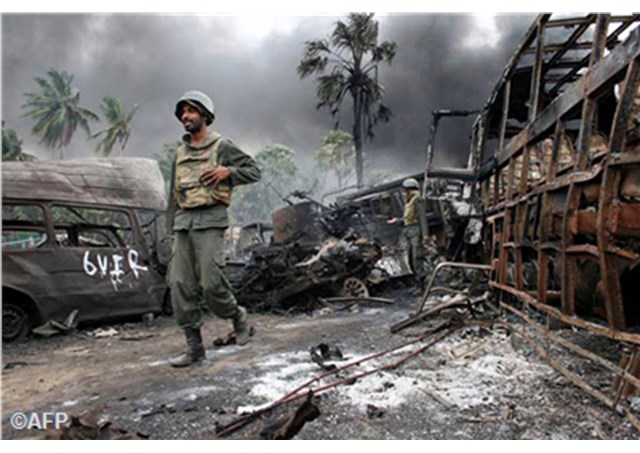
Sri Lankan leader vows to protect general accused of war crimes

Sri Lanka's president on Sunday vowed to protect his former ambassador to six South American nations, an ex-army chief accused of crimes in the bloody final phase of the country's civil war.
No one to touch military chiefs
``I state very clearly that I will not allow anyone in the world to touch Jagath Jayasuriya or any other military chief or any war hero in this country,'' President Maithripala Sirisena said on Sunday, addressing a convention of his Sri Lanka Freedom Party.
Sirisena's statement came a week after rights groups filed criminal lawsuits in South America against Jayasuriya, who until last week served as the country's envoy to Brazil, Argentina, Chile, Colombia, Peru and Suriname.
The suits are based on Jayasuriya's role as a commander in the final phase of Sri Lanka's civil war in 2009. They allege he oversaw military units that attacked hospitals and killed, tortured and made to disappear thousands of people.
The suits had been filed in Brazil and Colombia and more were to come in Argentina, Chile and Peru. Suriname had refused to accept the petition. Sri Lanka's military has also denied the allegations against Jayasuriya.
Sirisena wooing Sinhalese
Sirisena's comments are seen as an attempt to woo majority ethnic Sinhalese, most of whom oppose action against military personnel accused of crimes in the fight against the rebels of the Liberation Tigers of Tamil Eelam (LTTE) who fought for an independent homeland in the island nation. Sirisena is being painted as anti-Sinhalese by hard-line sections of the community.
More than 100,000 people are believed to have been killed in Sri Lanka's 26-year civil war, including 40,000 to 70,000 in the final phase alone.
UN seeking prosecution of war crimes
In a joint resolution in 2015 at the United Nations Human Rights Council, Sri Lanka promised among other things a truth-seeking mechanism, a judicial mechanism to prosecute those accused of human rights abuses, and a new constitution that covers the island nation's varied ethnicities and religions. However, little progress has been made.
Sri Lanka had agreed to allow foreign judges but backtracked later, insisting that only local courts could investigate the allegations.
In Sri Lanka’s intermittent civil war between 1983 to 2009, both the government forces and the LTTE have been accused of war crimes. (Source: AP)
| All the contents on this site are copyrighted ©. |


